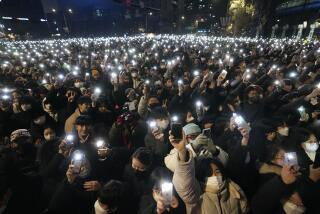Resolute Ways to Keep Those Resolutions
- Share via
If the New Year’s resolutions you made with firm resolve on Jan. 1 have bitten the dust, psychologist Donald Dossey isn’t surprised.
By the end of February, 95% of us have broken our New Year’s resolutions, Dossey said, because we don’t know how to make them in the first place.
“Ninety-nine percent of the people make New Year’s resolutions because everyone is talking about them and they feel they should make them,” said Dossey, founder of the Westwood-based Phobia Institute and a specialist in treating phobias and anxiety disorders. “Or they don’t make them for themselves, but for someone else. That doesn’t work.”
After 19 years of study, Dossey has found that “keeping resolutions is a lot like curing your phobias. There’s a certain way to do it . . . steps that have to be followed in order to succeed with resolutions or goals.
Changing Behavior
“Fear of change, tropophobia, is the biggest fear we have,” he said. “To cure a phobia, you have to change your behavior. You also have to change it if you’re going to keep a resolution you’ve made. Some people fear change so much that they don’t make any resolutions.”
Dossey also has found that there are trends in resolutions. “In the early ‘80s, people were making a lot of resolutions about quitting drugs and drinking,” he said. “But now, popular resolutions have to do with fitness and relationships. It’s the spirit of the times.”
After studying psycho-neurolinguistics in 1968-69, Dossey said he began to apply a communications theory to his psychological treatment, examining how certain words make impressions on how people behave.
He discovered that most people make resolutions “negatively, saying ‘I won’t do this or that.’ What follows the negative will be an unconscious and behavioral level, as if it were a deep hypnotic command, to respond exactly the opposite way. If you resolve ‘I won’t do this,’ you will.”
Instead, Dossey recommends making resolutions or goals in positive, specific terms: “I want to be fit and trim and at a certain weight,” or “I would like to have a smoke-free life and have healthy lungs.”
Broken Resolutions
Another reason most New Year’s resolutions are quickly broken--50% last no longer than two weeks, according to Dossey--is that “we try to do it only once a year,” he said. “We shouldn’t just pick one day of the year, but we should implement them throughout the year. Make every day a new year.”
Dossey, 53, born and raised in the San Joaquin Valley, opened his Phobia Institute in 1981 and now has several branch offices.
A former clinical psychology instructor at Pepperdine University and a consultant to the National Institute of Mental Health in conceptual psychiatry, he is practicing what he preaches: He just stopped drinking coffee a week ago.
“I was up to a half-gallon a day,” he said. “I was a caffeine addict and I just had to stop. One cup of caffeine will quadruple the amount of adrenalin in the body.”
Using his own techniques, Dossey has, in the past three years, also given up alcohol and smoking, separately.
Acknowledging the Problem
“I was using (alcohol) as a medication, but I was in denial,” he said. “That’s the biggest part of the problem, acknowledging it. I was not practicing what I was teaching my patients. I was smoking 2 1/2 packs of Shermans a day and had a hacking cough and was close to emphysema. Fear of dying motivated me to quit both.”
Having also lost 45 pounds over 1 1/2 years, Dossey sticks faithfully to a diet he calls “No CATS in San Francisco” (Coffee, Alcohol, Tobacco, Sugar, or Salt or Fat) which he also recommends to his patients.
“Three P’s” lead to failure, he added: “Perfectionism, which leads to procrastination and then to paralysis,” all of which affect people’s goal-making processes, whether they are trying to keep a resolution or cure a phobia.


